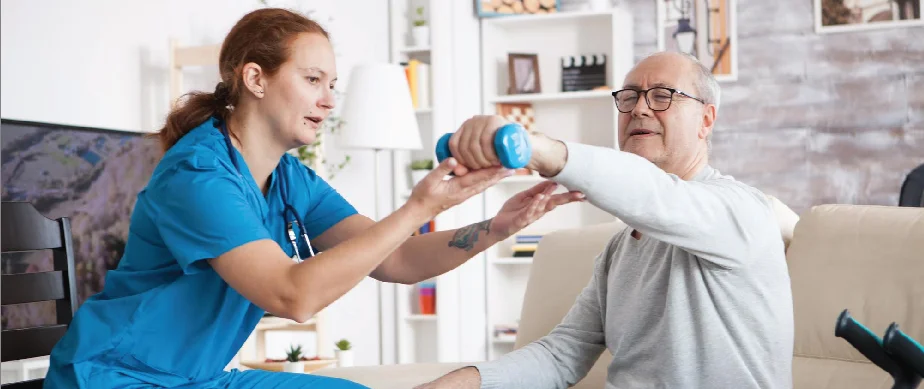
Book an Appointment
Call Us09958011121The Importance of Timely Stroke Management and Rehabilitation
A stroke, often referred to as a "brain attack," is a medical emergency that occurs when blood flow to the brain is disrupted, either due to a blocked blood vessel (ischemic stroke) or a ruptured blood vessel (hemorrhagic stroke). The best stroke treatment doctors suggest that stroke can lead to severe and long-lasting neurological damage, impacting various aspects of a person's life.
As per the World Health Organization, 1 in 4 adults, who are above 25 years old, are likely to have a stroke in their lifetime. In fact, at present, there are over 110 million people globally, who have experienced a stroke. Fortunately, there have been many advancements and innovations that have made it possible to not only save the lives of patients but also help them to overcome various complications and challenges, thereby enabling them to lead a quality life.
The Window of Opportunity
Every second is crucial when it comes to stroke management. Depletion of oxygenated blood causes the brain cells to die at a rapid and progressive rate. As per the best stroke treatment doctor, without early medical intervention, around 4 million neurons, 12 million brain cells and 15 billion synapses are lost with every passing minute. The aim of timely treatment is to save the patient’s life, prevent further damage and restore lost function. The "golden hour", which refers to the critical 60-minute window after a stroke during which medical treatment can potentially minimize brain injury and improve outcomes. Administering the right treatment within this timeframe can significantly enhance a patient's chances of recovery. Immediate stroke management also extends to recognizing stroke symptoms and seeking medical attention promptly.
The Role of Rehabilitation
While swift intervention can mitigate immediate damage, stroke survivors often face challenges during their recovery journey. This is where post-stroke rehabilitation comes into play. Rehabilitation is a comprehensive process that aims to help individuals regain lost abilities, and adapt to any lasting physical or cognitive impairments. Recommended by experts specializing in the best stroke treatment in Delhi, rehabilitation is a multidisciplinary approach that involves many healthcare professionals working together to tailor a rehabilitation plan to each patient's specific needs.
- Physical Rehabilitation: Many stroke survivors experience paralysis or weakness in certain parts of their body. Physical therapists work with patients to improve muscle strength, balance, coordination, and mobility through exercises and therapeutic techniques. This not only enhances their ability to perform daily activities but also reduces the risk of complications such as muscle atrophy and joint contractures.
- Occupational Rehabilitation: Occupational therapists focus on helping stroke survivors regain their independence in daily activities like dressing, bathing, eating, and grooming. They also assist in adapting the living environment to accommodate any physical limitations, allowing individuals to regain a sense of normalcy and control over their lives.
- Speech and Language Rehabilitation: A stroke can lead to communication and swallowing difficulties due to damage to the brain areas responsible for these functions. Speech-language pathologists work with patients to improve speech, language comprehension, and swallowing abilities. Effective communication not only facilitates social interaction but also helps in expressing needs and emotions.
- Cognitive Rehabilitation: Many stroke survivors experience cognitive impairments such as memory loss, attention deficits, and problem-solving challenges. Cognitive rehabilitation focuses on retraining cognitive skills through exercises and strategies that enable individuals to regain cognitive function and improve their quality of life.
The impact of stroke reaches far beyond its initial occurrence, touching the lives of survivors and their families in profound ways. Timely stroke management is the first crucial step in preventing further damage, and post-stroke rehabilitation is the cornerstone of the recovery process. The collaboration between healthcare professionals, stroke survivors, and their support systems ensures that survivors can regain lost abilities, adapt to new challenges, and ultimately reclaim a fulfilling life. You can get the best stroke treatment doctors at IBS Hospital.
 By -Dr Aaksha Shukla |
September 22, 2023 | 9 Min Read
By -Dr Aaksha Shukla |
September 22, 2023 | 9 Min Read
Parkinson’s Disease Treatment Hospital in India
Brain Stroke Treatment Hospital – Emergency Care
Stroke Paralysis Treatment Hospital – Advanced Neuro Care
Paralysis Treatment Hospital in India – Cost & Recovery
Brain Infection Symptoms, Causes, and When to Seek Emergency Care
Is Spine Surgery Right for You? Here’s How to Know
Brain Health at Every Age: Preventive Neurology Tips
International Patient Guide: Visiting India for Neuro & Spine Treatments
Robot-Assisted & Navigation-Guided Surgery: Safer Brain & Spine Procedures
Sports Injury Recovery: How Arthroscopy Helps You Heal Faster?
How Deep Brain Stimulation (DBS) Helps in Parkinson’s & Tremor Control
Early Warning Signs of a Brain Tumour & When to See a Neurosurgeon
Signs of a Stroke: When to Seek Emergency Neuro Care
Best Neurosurgery Hospitals in Delhi NCR: A Detailed Guide
Minimally Invasive Spine Surgery: Benefits, Cost & Recovery
Best Tips for Sports Injury Recovery
Guide to Stroke Prevention and Recovery
How to Manage Parkinson’s Symptoms Effectively

